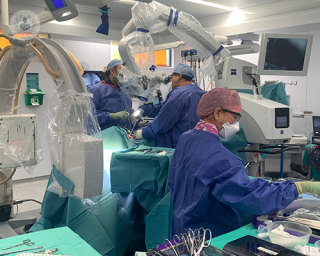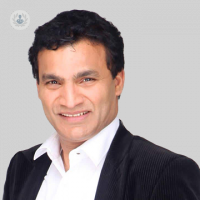Discectomy
Mr G Michael Hess - Orthopaedic surgery
Created on: 12-17-2015
Updated on: 05-10-2023
Edited by: Aoife Maguire
What is a discectomy?
Discectomy is a surgical procedure to partially or completely remove a spinal disc. The spinal disc is the cushion that separates the vertebrae, the bones that make up your spine.

Why is a discectomy performed?
A discectomy is usually performed to treat a herniated spinal disc. A spinal disc hernia means that some of the fluid has leaked out and has begun to press on the surrounding nerved. This can produce pain in the back that spreads to the legs and causes intense weakness in the muscles.
A discectomy is carried out when more conservative measures, such as physiotherapy and steroids, have failed to alleviate the pain and weakness from the hernia. Where a discectomy is performed to correct problems caused during a previous discectomy, it is known as a revision discectomy.
What happens during a discectomy?
A discectomy is generally carried out under general anaesthesia and may require an overnight hospital stay. To access the herniated disc, surgeons may either perform open surgery or make use of keyhole techniques (also known as a microdiscectomy). In some cases it may be necessary to remove part of the vertebra to get access to the herniated disc.
The aim is to remove only the part that is herniated, but in some cases the surgeon may need to remove the whole disc. If the whole disc is taken out the surgeon will need to fill the space with bone, which could come from a donor or could be made from synthetic material.
Preparing for discectomy
No special preparation for discectomy is required. You will, however, need to inform the doctor of any medications you are taking including herbal supplements. You will also need to see the anaesthetist prior to the operation to assess your suitability for general anaesthetic.
Aftercare
Recovery after discectomy is usually rapid. You will usually be asked to get up and walk as soon as the anesthesia wears off and often you can return home the same day of the surgery.
At first you may feel pain, weakness or numbness, which should disappear during the next few weeks. For an optimal recovery, it is recommended to walk as often as possible, and your rehabilitation program should include physiotherapy and exercises to carry out at home.
As for returning to work, if it is in an office, you can return after two or four weeks; on the other hand, if it is a job that requires manual labour, it can usually be resumed after four to eight weeks.

















